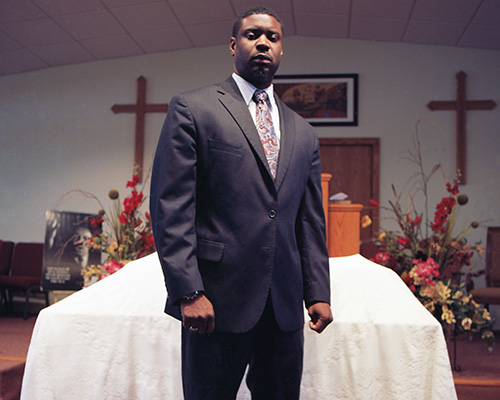“Injustice anywhere is a threat to justice everywhere.”
—Rev. Martin Luther King Jr.
This quote by Martin Luther King Jr. scares me. It reminds me that I have a responsibility to challenge injustice wherever I see it. I used to believe that I had no power to change systems of oppression, so all I could do was be a critic and hope for eventual change.
One day Rev. Donte Hilliard asked me, “You are not powerless against oppression, so what are you going to do with the power that you have been given?” As a black pastor and a straight man, I thought I would not even come close to being an ally for anyone in the LGBTQ community. While I have friends who are gay, two sisters who are lesbians, and transgender friends, I listened to their stories of having to separate their lives into being black, queer, and Christian with empathy and sadness. When I became Pastor of Christ the Solid Rock Baptist Church in Madison, those words became even more relevant: What will I do with the power that I have been given?
One Sunday morning during worship, Sharon “Shae” Frazier walked up to the altar and announced that God had healed her and restored her vision. I stopped service, assuming that I was being punked on TV. But she said it again, “God has healed my eyes. I can see. I can read the church bulletin. All I wanted was for God to heal my eyes so I could see again.” Doctors had just told Shae that her vision would be lost. But standing at the altar of Christ the Solid Rock was this lesbian woman witnessing that God’s love had touched her so deeply that she could see again.
After that moment, Shae and her life partner, Renee, came up to me after service and humbly said, “We are a couple and have been together for 44 years. Are you okay with us?” I smiled and answered, “Not only am I okay. God is okay as well.” Those two women gave me the biggest hug and cried. They held me and cried, as they never thought a black pastor would accept them into the church. I told them, “God accepts us all.” I would later marry them on the steps of the Dane County Courthouse and then eventually in the sanctuary of Christ the Solid Rock Baptist Church.
The Challenge
It is no secret that a majority of traditional black churches still preach and teach a hermeneutic of hate regarding gays and lesbians. Even though musicians, praise dancers, deacons, trustees, choir members, and even some pastors are either closeted or openly gay, preachers routinely preach rhetorically homophobic sermons. I am adamant that this has to stop. NOW! We cannot continue to accept this or to act as though it is okay or to be dismissive. Every time a sermon is preached that or justifies oppression because the Bible “tells me so,” it just dehumanizes some of our friends and family and places broken spirits deeper into closets of despair.
In my church, no hate-filled preaching is allowed in our pulpit. The pulpit in the black church is the sacred desk. It is the place where the divine and humanity are joined together as the Spirit descends to empower everyday people to transcend the limitations of hurt and culture. It is a powerful instrument that can yield positives such as giving birth to the Civil Rights struggles or negatives such as disempowering people and making them nothing more than the walking dead. I decided that at a minimum at Christ the Solid Rock that no one preaching in the church’s pulpit will preach a message of hate, homophobia, and fear-peddling. It is amazing how the messages transform from ones of hell and damnation to those of love and empowerment. But limiting the types of preaching is not enough.
A Ministry of Presence
I recognize the enormous responsibility I have as a Pastor of all people. The pastor in a black church is the spiritual leader of the congregation and as such sets the tone for how the congregation thinks about its mission related to the gospel. I needed to embody in action the support of standing and using the power I had been given to expose the people to the power of God’s love. So I had to begin a journey of sitting and listening to my LGBTQ brothers and sisters.
I learned that the most powerful weapon for justice is just to embody the ministry of presence. I publicly embraced the ministries of young men and women of color who were shunned at other churches because they were openly gay. I supported organizations such as Freedom Inc. who were doing work to bring brown, yellow, and black children together in order to discuss issues related to sexual orientation and identity. I admit that being a straight black man comes with a great deal of limitations when thinking about LGBTQ advocacy. But my journey into learning and ultimately using the power I have to fight for LGBTQ inclusion has been a walk of humility and love.
At Christ the Solid Rock our motto is “The Church where everybody is somebody.” In the church, I challenged the congregation by beginning to teach and preach on the power and the necessity of inclusion in Jesus’ ministry. Adamant about biblical truths, some of my members who had grown up in traditional and conservative biblical environments challenged my interpretation and perceptions of the Bible. But I continued to remind them that God is a power and force of love that transcends the boundaries of the biblical text and enters the very heart of every human being. I thought the congregation was poised to be a different kind of congregation because of the chorus of “Amens” I received after preaching those fiery sermons on God’s love. Needless to say, when I announced that I would marry Shae and Renee in the church, I found prejudice had been planted deeper into the culture of the black community than I’d thought.
Walking the Walk
The preaching of inclusion of gays and lesbians was different than actually performing a marriage ceremony of two lesbians, especially in the church. When I announced that I would marry them in the church, “all hell broke loose.” I heard traditional arguments: Adam and Eve, not Steve; Man should not lay with a man; it is unnatural; people choose to be gay; no one is born that way; etc. People were talking in churches, barbershops, at school, on Facebook about this preacher teaching that it is all right to be gay.
I realized that in order to dismantle the constructs that suppress even the gentlest hearts of people, I needed to give my people the tools to deconstruct the false narratives that they had been taught through church and in parts of black culture. I was compassionate and sympathetic because these thoughts were all people had been taught. Many had never been offered a different narrative until I confronted their deep-seated homophobia reinforced by generations of families. I often remind black Christians that their arguments of condemning gays and lesbians are similar to the arguments of those who used the Bible, science, and history to justify the atrocious brutality and economics of slavery. I continued to teach, brought in others to help discuss uncomfortable positions regarding sexuality and sexual identity, engaged in a hundred small conversations about whether this was right or wrong. I stood and continued to preach a message of inclusion and love.
I also taught a different vision of Jesus. I wanted them to wrestle with the reality of a Jesus who did not come to just die so we could get to heaven. I wanted them to address a Jesus that sat with those that everyone in their culture rejected and turned over tables in a temple that had normalized injustice. It is a Jesus that sought to change systems that oppressed and excluded by exposing the ability of those in power to kill someone who encouraged marginalized people to stand up and be free. This is a Jesus that reminded us “That whatever you do unto the least of these, you do unto me.” Therefore our treatment of our gay brothers and sisters is a reflection of our love and treatment of Jesus.
There were members who left the church. There were black pastors who I considered friends who turned their backs on me. There were members who openly criticized me for leading people in the wrong direction. But I knew then as much as I know now that marrying Shae and Renee was a symbol of God’s loving power that all human beings need to experience. I stood on my faith and faced the fears and anger of many.
As a Christian, Baptist-raised, straight black man, I am often asked by my gay and lesbian friends, “Why would you get involved in this issue?” If I am around straight black people, I am often reprimanded because some do not see the intersection between gay rights and civil rights. But I listen to my sisters, Shuntol and Artrai, and I hear their pain and struggle to hear a prophetic voice willing to be vulnerable and risk everything to do what is right—for them, and others like them. I figured, at the church, the least I can do is risk it all in the name of equality and trust that God will have the last word.
I have been helped in this and learned to be a better listener thanks to people such as Rev. Christopher Long, my mentors Linda Ketcham and Kim Fisher, Donte Hilliard, Perry Williams, Clyde Mayberry, M Adams, Jasmine Timmons, and Z! Haukeness. These circles of friends teach me on a continual basis about the power of love, trust and the strength of the human spirit to make positive change.
Every one of them is worth me taking the risk of being shunned because, at the end of the day, it is their stories that remind me, “Silence is not an option.” Jesus asked Peter, “Do you love me?” Peter responded, “Yes!” And so Jesus responded, “Feed my sheep!” I am feeding the sheep with love by transforming systems of oppression.
Faith in a Better Future
I will end where I began—“injustice anywhere is a threat to justice everywhere”—because I recognize that injustices are interrelated. When we march in the streets shouting, “Black Lives Matter,” it resonates from a belief that all people should be included within the chorus of human importance.
Places of worship will become irrelevant if we do not use the power that we have to include and fight for those voices that are often excluded from the mainstream community. We can and must continue to fight. It was both amazing but sad that in 2014 a small Baptist congregation in Madison was the first black Baptist church in Wisconsin to have the courage to marry a same gender couple. The end of the world did not happen because of the ceremony. If anything it removed a barrier so that the creative power of God can give us the strength to tackle the depth of racism in liberal Madison. Because in order to fight this enemy, we will need all brothers and sisters, gay and straight, together singing in one loud chorus, demanding equality for all.























0 Comments